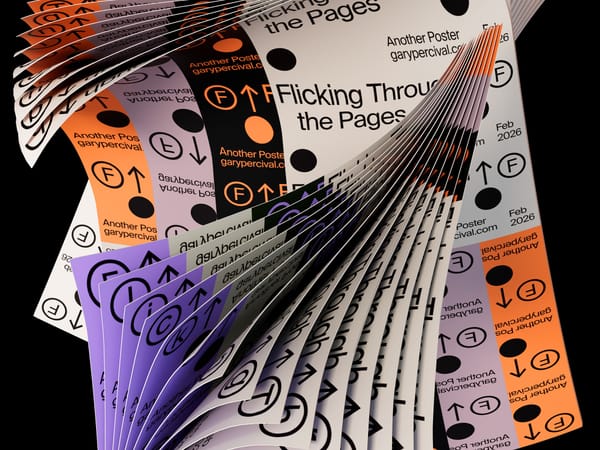Sweet or Bitter? How Your Mindset Shapes the Life You See
“Every day, in every client interaction and project challenge, you have a choice: to see the bitter—the difficulties, frustrations, and unfairness of it all—or to see the sweet—the opportunities, lessons, and potential for growth.”

As creatives, we've all been there: that moment when a client requests yet another revision, when a project falls through, or when inspiration seems to have packed its bags and left town.
In these moments, we face a choice that's more powerful than any design tool or creative technique—we choose how to perceive what's happening to us.
The Reality of Creative Work
The creative industry presents unique psychological challenges precisely because our work is so personal.
Each design, each illustration, and each concept carries a piece of ourselves. We don't just invest time and skill—we invest heart, vision, and identity into our creations. This emotional investment makes our relationship with our work complex and sometimes fraught with tension.
The Science Behind Your Creative Lens
Research in cognitive psychology reveals that our mindset isn't just about "positive thinking"—it's a lens that literally shapes how we perceive and interact with our world.
When we approach situations with a growth mindset, our brains become more active in areas associated with problem-solving and learning. We see possibilities where others see dead ends.
The Bitter Trap
The creative industry is challenging precisely because our work is personal. We pour our hearts into each design, illustration, and concept.
When criticism comes (and it always does), it’s easy to take it personally and fall into what I call the “bitter trap”—a mindset that frames our challenges as personal affronts:
• Viewing clients as adversaries rather than partners
• Seeing market changes as threats rather than opportunities
• Treating feedback as criticism rather than valuable insight
• Perceiving competition as enemies rather than sources of inspiration
The bitter trap is seductive because it can feel validating—it’s often easier to blame others or external circumstances than to reflect inward. Yet, this mindset comes with a steep cost: it clouds judgement, limits growth, and ultimately stifles success.
The Sweet Spot: Reframing Your Creative Journey
So, what’s the alternative?
Finding the “sweet spot” in your mindset doesn’t mean ignoring the real challenges or pretending everything is perfect. Instead, it’s about choosing a more balanced and constructive way to approach your experiences.
From Criticism to Insight
Instead of viewing client feedback as an attack on your creativity, see it as valuable market research. Every revision request is telling you something about your client's needs, their audience, or their business goals.
From Competition to Inspiration
Rather than feeling threatened by other creatives' success, use it as market intelligence. What are they doing right? What gaps are they leaving in the market? How can you differentiate yourself?
From Scarcity to Abundance
Stop viewing the creative market as a zero-sum game. There's enough work to go around, and different clients need different types of creators. Focus on finding and serving your ideal clients rather than trying to please everyone.
From Perfectionism to Progress
Embrace the iterative nature of creative work. Each project, even the challenging ones, is building your portfolio, skills, and understanding of your market.
Five Mindset Shifts That Transform Your Creative Practice
Embrace the Messy Middle
Instead of expecting linear progress, welcome the chaos of the creative process. Those moments of uncertainty, the creative blocks, the seemingly endless iterations—these aren't obstacles to your success; they're the very path toward it. Start seeing the messy parts of your process as valuable data points rather than failures.
Practice Radical Ownership
When projects go sideways (and they will), resist the urge to place blame. Take complete ownership of both successes and setbacks. Ask yourself, "What can I learn from this?" and "How might I handle this differently next time?" This shift from blame to ownership immediately puts you back in the driver's seat.
Cultivate Strategic Detachment
While pouring your heart into your work, maintain enough emotional distance to make clear-headed decisions. Remember that feedback about your work isn't feedback about your worth. Practice separating your identity from individual projects—you are not your last design, illustration, or campaign.
Embrace Micro-Experiments
Instead of making sweeping changes, conduct small experiments in your practice. Try new approaches with low-stakes projects. Test different ways of communicating with clients. Each experiment is an opportunity to gather information without the pressure of permanent commitment.
Develop Future-Focus
Rather than dwelling on past disappointments or current challenges, regularly imagine your future self. What would your future self want you to learn from this moment? How would they want you to respond? This perspective shift can transform immediate frustrations into stepping stones toward your larger goals.
The Business Impact of Your Mindset
Your mindset isn't just about feeling better; it directly affects your bottom line.
Creators who maintain a growth-orientated, constructive mindset tend to:
- Build stronger client relationships that lead to repeat business.
- Identify and capitalise on new market opportunities.
- Adapt more quickly to industry changes.
- Produce more innovative work.
- Command higher rates.
- Experience less burnout.
The Choice Is Yours
Every day, in every client interaction and project challenge, you have a choice. You can choose to see the bitter—the difficulties, the frustrations, the unfairness of it all. Or you can choose to see the sweet—the opportunities, the lessons, the potential for growth.
This choice doesn't just affect how you feel; it shapes the very reality of your creative business. It influences how clients perceive you, how you approach challenges, and ultimately, the success you achieve.
Your Turn to Reflect
Take a moment to consider:
- What "bitter" narratives might be holding you back?
- How could reframing your challenges open up new opportunities?
- What one step could you take today to shift your mindset?
The creative journey isn't always easy, but with the right mindset, it can be consistently rewarding. The choice between sweet and bitter isn't made once—it's made every day, in every interaction, with every challenge.
The Path Forward: Your Mindset Legacy
Every seasoned creative will tell you that their journey wasn't a straight line to success. It was a series of choices—some conscious, some unconscious—that shaped not only their work but their entire experience of the creative life.
The beauty of mindset work is that it's both immediate and cumulative: you can choose differently right now, in this moment, while also building a foundation for how you'll navigate challenges years from now.
Think of your mindset as leaving footprints in the sand of your creative journey. Each step, each choice, and each perspective you embrace creates a path that others can follow—your clients, your collaborators, and perhaps even the next generation of creatives in your field.
The question isn't whether you'll leave a legacy, but what kind of legacy you want to leave.
So start small, but think big. Choose sweet not because it's easy (it often isn't), but because it opens doors that bitterness keeps firmly shut.
Choose growth not because you'll always succeed (you won't), but because the attempt itself shapes who you become.
Choose possibility not because it guarantees results, but because it guarantees you'll remain open to them when they appear.
Remember: In the end, your mindset isn't just about surviving in the creative industry—it's about thriving in it, shaping it, and making it better for everyone who follows in your footsteps.
The choice, as always, is yours. What will you choose today?



